江苏省高邮市阳光双语初中2020年七年级下英语 Unit 2 Neighbours Welcome Reading导学案(含答案)
文档属性
| 名称 | 江苏省高邮市阳光双语初中2020年七年级下英语 Unit 2 Neighbours Welcome Reading导学案(含答案) | 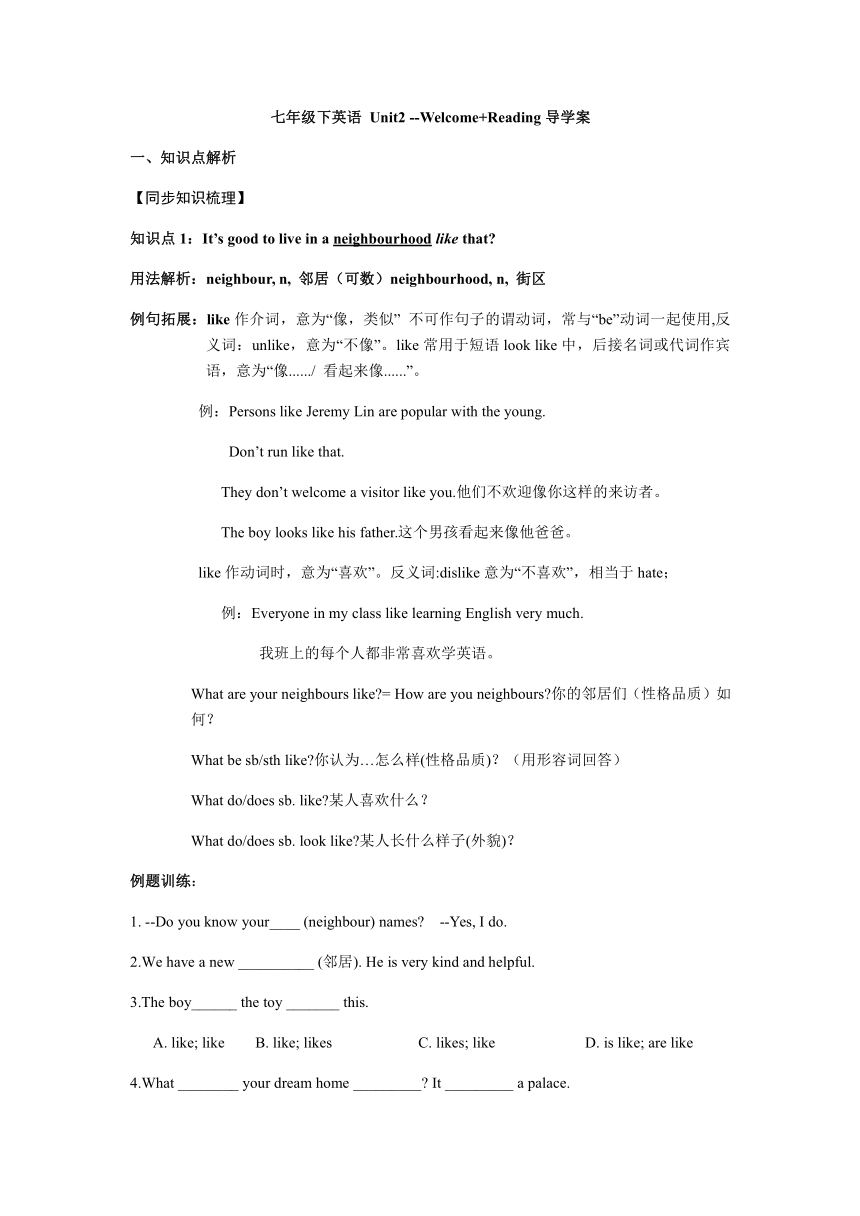 | |
| 格式 | zip | ||
| 文件大小 | 49.5KB | ||
| 资源类型 | 教案 | ||
| 版本资源 | 牛津译林版 | ||
| 科目 | 英语 | ||
| 更新时间 | 2020-01-31 07:50:17 | ||
图片预览

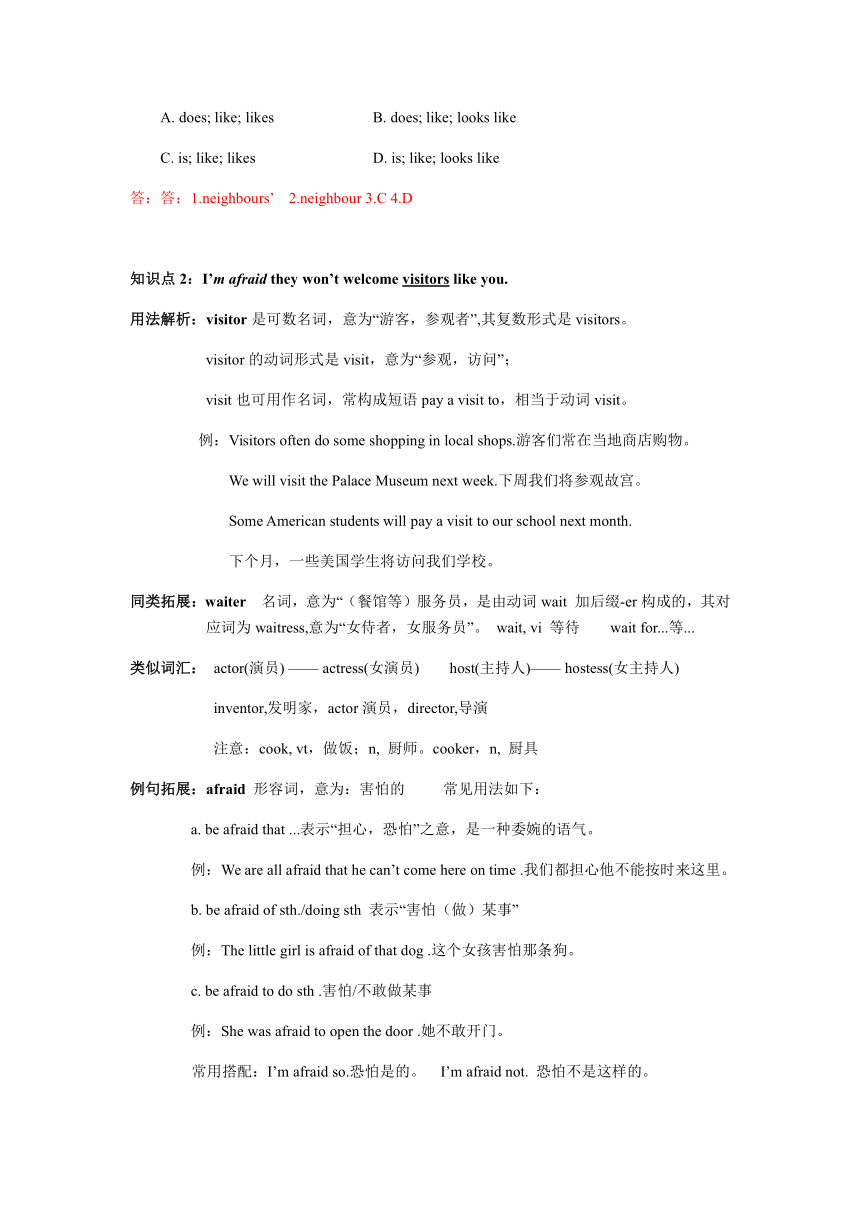
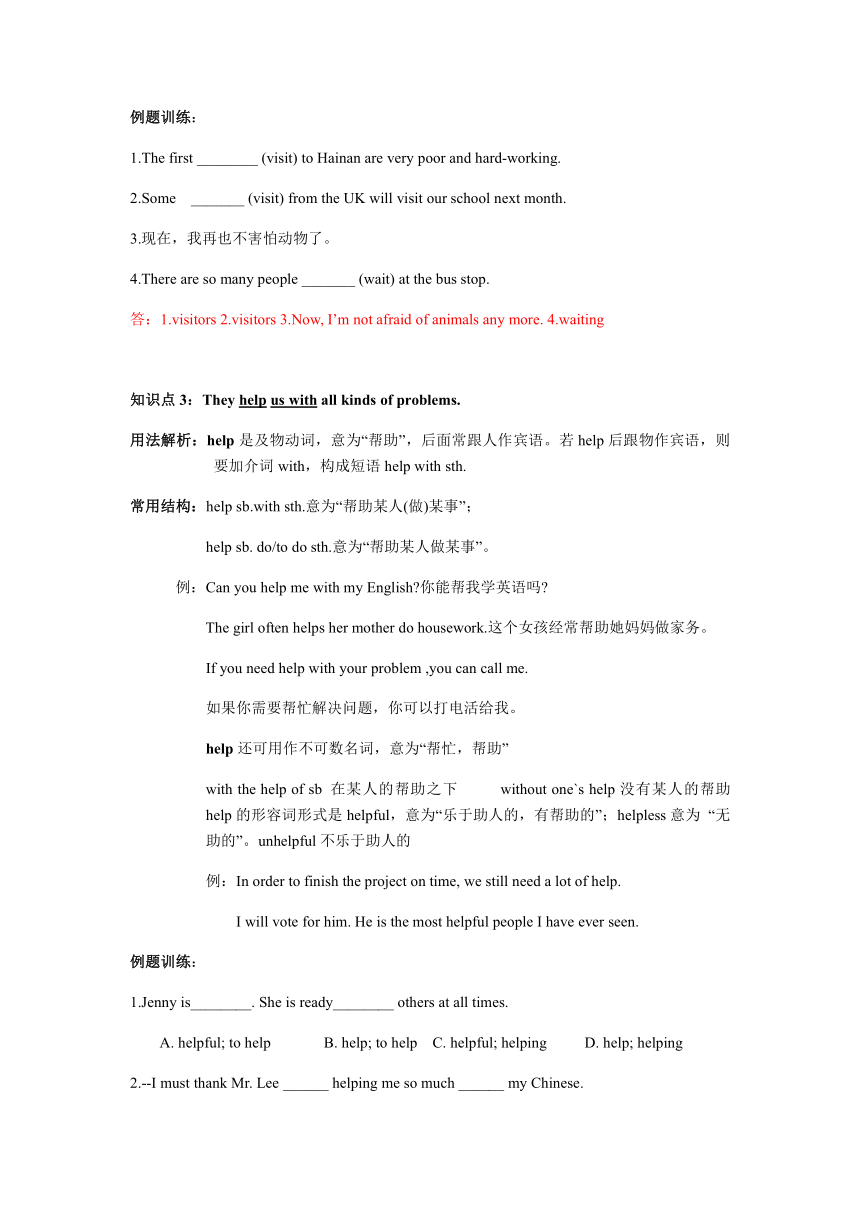
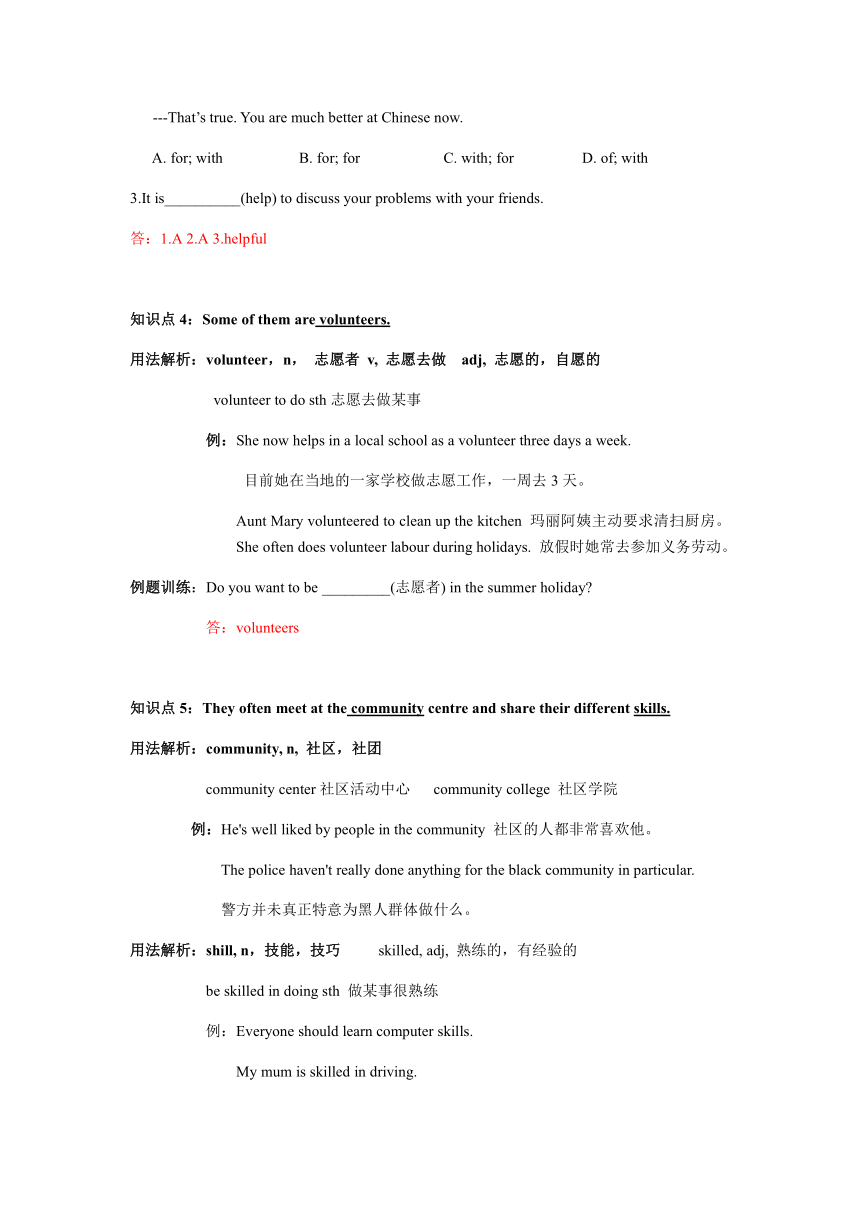
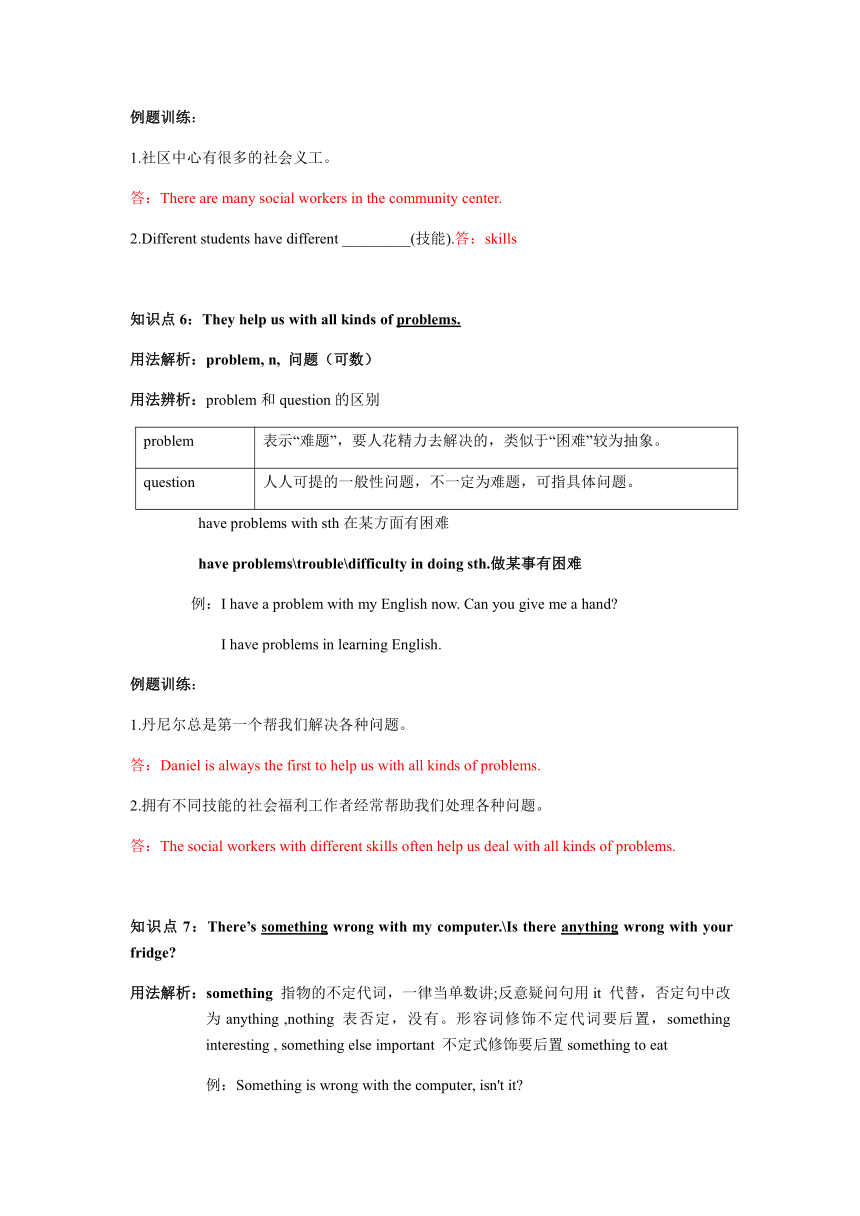
文档简介
七年级下英语 Unit2 --Welcome+Reading导学案
一、知识点解析
【同步知识梳理】
知识点1:It’s good to live in a neighbourhood like that?
用法解析:neighbour, n, 邻居(可数)neighbourhood, n, 街区
例句拓展:like作介词,意为“像,类似” 不可作句子的谓动词,常与“be”动词一起使用,反义词:unlike,意为“不像”。like常用于短语look like中,后接名词或代词作宾语,意为“像....../ 看起来像......”。
例:Persons like Jeremy Lin are popular with the young.
Don’t run like that.
They don’t welcome a visitor like you.他们不欢迎像你这样的来访者。
The boy looks like his father.这个男孩看起来像他爸爸。
like作动词时,意为“喜欢”。反义词:dislike意为“不喜欢”,相当于hate;
例:Everyone in my class like learning English very much.
我班上的每个人都非常喜欢学英语。
What are your neighbours like?= How are you neighbours?你的邻居们(性格品质)如何?
What be sb/sth like?你认为…怎么样(性格品质)?(用形容词回答)
What do/does sb. like?某人喜欢什么?
What do/does sb. look like?某人长什么样子(外貌)?
例题训练:
1. --Do you know your____ (neighbour) names? --Yes, I do.
2.We have a new __________ (邻居). He is very kind and helpful.
3.The boy______ the toy _______ this.
A. like; like B. like; likes C. likes; like D. is like; are like
4.What ________ your dream home _________? It _________ a palace.
A. does; like; likes B. does; like; looks like
C. is; like; likes D. is; like; looks like
答:答:1.neighbours’ 2.neighbour 3.C 4.D
知识点2:I’m afraid they won’t welcome visitors like you.
用法解析:visitor是可数名词,意为“游客,参观者”,其复数形式是visitors。
visitor的动词形式是visit,意为“参观,访问”;
visit也可用作名词,常构成短语pay a visit to,相当于动词visit。
例:Visitors often do some shopping in local shops.游客们常在当地商店购物。
We will visit the Palace Museum next week.下周我们将参观故宫。
Some American students will pay a visit to our school next month.
下个月,一些美国学生将访问我们学校。
同类拓展:waiter 名词,意为“(餐馆等)服务员,是由动词wait 加后缀-er构成的,其对应词为waitress,意为“女侍者,女服务员”。 wait, vi 等待 wait for...等...
类似词汇: actor(演员) —— actress(女演员) host(主持人)—— hostess(女主持人)
inventor,发明家,actor演员,director,导演
注意:cook, vt,做饭;n, 厨师。cooker,n, 厨具
例句拓展:afraid 形容词,意为:害怕的 常见用法如下:
a. be afraid that ...表示“担心,恐怕”之意,是一种委婉的语气。
例:We are all afraid that he can’t come here on time .我们都担心他不能按时来这里。
b. be afraid of sth./doing sth 表示“害怕(做)某事”
例:The little girl is afraid of that dog .这个女孩害怕那条狗。
c. be afraid to do sth .害怕/不敢做某事
例:She was afraid to open the door .她不敢开门。
常用搭配:I’m afraid so.恐怕是的。 I’m afraid not. 恐怕不是这样的。
例题训练:
1.The first ________ (visit) to Hainan are very poor and hard-working.
2.Some _______ (visit) from the UK will visit our school next month.
3.现在,我再也不害怕动物了。
4.There are so many people _______ (wait) at the bus stop.
答:1.visitors 2.visitors 3.Now, I’m not afraid of animals any more. 4.waiting
知识点3:They help us with all kinds of problems.
用法解析:help是及物动词,意为“帮助”,后面常跟人作宾语。若help后跟物作宾语,则要加介词with,构成短语help with sth.
常用结构:help sb.with sth.意为“帮助某人(做)某事”;
help sb. do/to do sth.意为“帮助某人做某事”。
例:Can you help me with my English?你能帮我学英语吗?
The girl often helps her mother do housework.这个女孩经常帮助她妈妈做家务。
If you need help with your problem ,you can call me.
如果你需要帮忙解决问题,你可以打电活给我。
help还可用作不可数名词,意为“帮忙,帮助”
with the help of sb 在某人的帮助之下 without one`s help没有某人的帮助help的形容词形式是helpful,意为“乐于助人的,有帮助的”;helpless意为 “无助的”。unhelpful不乐于助人的
例:In order to finish the project on time, we still need a lot of help.
I will vote for him. He is the most helpful people I have ever seen.
例题训练:
1.Jenny is________. She is ready________ others at all times.
A. helpful; to help B. help; to help C. helpful; helping D. help; helping
2.--I must thank Mr. Lee ______ helping me so much ______ my Chinese.
---That’s true. You are much better at Chinese now.
A. for; with B. for; for C. with; for D. of; with
3.It is__________(help) to discuss your problems with your friends.
答:1.A 2.A 3.helpful
知识点4:Some of them are volunteers.
用法解析:volunteer,n, 志愿者 v, 志愿去做 adj, 志愿的,自愿的
volunteer to do sth志愿去做某事
例:She now helps in a local school as a volunteer three days a week.
目前她在当地的一家学校做志愿工作,一周去3天。
Aunt Mary volunteered to clean up the kitchen 玛丽阿姨主动要求清扫厨房。 She often does volunteer labour during holidays. 放假时她常去参加义务劳动。
例题训练:Do you want to be _________(志愿者) in the summer holiday?
答:volunteers
知识点5:They often meet at the community centre and share their different skills.
用法解析:community, n, 社区,社团
community center社区活动中心 community college 社区学院
例:He's well liked by people in the community 社区的人都非常喜欢他。
The police haven't really done anything for the black community in particular.
警方并未真正特意为黑人群体做什么。
用法解析:shill, n,技能,技巧 skilled, adj, 熟练的,有经验的
be skilled in doing sth 做某事很熟练
例:Everyone should learn computer skills.
My mum is skilled in driving.
例题训练:
1.社区中心有很多的社会义工。
答:There are many social workers in the community center.
2.Different students have different _________(技能).答:skills
知识点6:They help us with all kinds of problems.
用法解析:problem, n, 问题(可数)
用法辨析:problem和question的区别
problem 表示“难题”,要人花精力去解决的,类似于“困难”较为抽象。
question 人人可提的一般性问题,不一定为难题,可指具体问题。
have problems with sth在某方面有困难
have problems\trouble\difficulty in doing sth.做某事有困难
例:I have a problem with my English now. Can you give me a hand?
I have problems in learning English.
例题训练:
1.丹尼尔总是第一个帮我们解决各种问题。
答:Daniel is always the first to help us with all kinds of problems.
2.拥有不同技能的社会福利工作者经常帮助我们处理各种问题。
答:The social workers with different skills often help us deal with all kinds of problems.
知识点7:There’s something wrong with my computer.\Is there anything wrong with your fridge?
用法解析:something 指物的不定代词,一律当单数讲;反意疑问句用it 代替,否定句中改为anything ,nothing 表否定,没有。形容词修饰不定代词要后置,something interesting , something else important 不定式修饰要后置something to eat
例:Something is wrong with the computer, isn't it?
Could you tell me something interesting? I feel sleepy.
注:would you like /could you /can I结构还用something, 表委婉语气,或希望得到肯定回答。
There’s something wrong with...表示“...出毛病 ”。
=Something is wrong with....
There’s nothing / not anything wrong with...表示“...没有毛病 ”
= Nothing is wrong with....
例:There’s something wrong with my computer. = My computer is broken.
= My computer doesn’t work.=My computer isn’t working. 我的电脑坏了。
someone, pron,相当于somebody,多用于肯定句,也用于疑问句,表示请求,建议或反问。
例:Why not ask someone to help you?
其他的不定代词:someone/somebody
anyone/anybody/anything everyone/everybody/everything
nobody(=no one)/nothing
例题训练:
1.—Mom, can I have _______ to drink? —Sorry, there’s _______ in the fridge. We can go to the supermarket to buy _______.
A. anything; nothing; something B. anything; none; something
C. something; none; anything D. something; nothing; something
2.Mr Jiang likes cooking. He will cook ____ for his family this evening.
A. nice something B. nice anything C. something nice D. anything nice
3.恐怕这些机器出故障了。
答:I’m afraid there is something wrong with these machines.
I’m afraid something is wrong with these machines.
I’m afraid these machines are broken.
I’m afraid these machines don’t work.
1.D 2.C
知识点8:I’m going to ask a computer engineer to check it.
用法解析:engineer,n, 工程师,技师
例:They send a service engineer to fix the disk drive.
他们派出维修人员来修磁盘驱动器。
例题训练:His dream is to become a software _________(工程师).
答:engineer
用法解析:check,vt检查,核实 n,检查;账单;支票
例:Check your homework before you hand it in.你在交作业之前,检查一下。
The teacher made a careful check of his paper.
The boss drew a check for 10000 yuan.老板开了一张一万元的支票。
例题训练:"Simon, _____________ (检查) your homework carefully ,' the mother says to the little boy.
答:check
知识点9:My cousin Annie’s bicycle is broken, so she’s going to ask someone to fix it.
用法解析:broken,损坏的,破碎的
例:My bike is broken.
break, v, 打破,损坏,破碎 break-broke-broken
break,n, 破裂,天亮,休息
break down坏掉,(机器)出故障 break out (战争)爆发 break up分手
例:He got there at the break of the day.他天亮时到了那里。
Let's have a break!我们休息一下吧。
例题训练:
1.─Do you know who________ the glass?
─Sorry,I don't know. Who is the owner of the ________glass?
A. broken; broken B. broke; broken
C. breaks; broke D. broken; broke
2.My ipad is __________ (break). I can’t listen to music any more.
答:B broken
用法解析:fix, vt 安装,使固定,其后直接跟名词、代词作宾语。
(1)fix 用作“安装”,指安装门窗,电灯,机器等。
例:he is fixing a lamp in the room. 他正在房间里安灯。
(2)fix 用作“使固定”,指把某物固定在另一物体上。
例:we will fix the picture on the wall. 我们要把图画贴在墙上。
(3)fix 也可以表示“修理”之意,与repair 可互换。
例:I can fix the iPhone for you .我可以为你修理苹果手机。
He has had my bike fixed.
When I was young, I always liked fixing the toys.
用法辨析:mend /repair/ fix 都表“修理” 用法和意义的不同:
1、repair:“修理”的对象着重于破损、毁坏或发生故障不能正常使用的物体。
例:When I got home, my brother was repairing his radio.
当我到家的时候,哥哥正在修理收音机。
2、mend:“修理”的对象是一些琐碎的物品。如粘贴的小用具、玩具,要缝补的衣物等。
例:My kite is broken. Can you mend it? 我的风筝坏了,你能修吗?
Before my father used the car, he mended it well.
3、fix:用于需要重新“调”物体的结构,把松散的部件固定结实,将分离的物体各部分装配起来。
例:Please fix a lid on the box. 请给这盒子装上盖子。
例题训练:
1.That engineer is going to help me _________(fix) my bike.
答:fix
2.我叔叔正在修那个小女孩的自行车。
答:My uncle is fixing that girl’s bike.
知识点10:Some college students are ready to help.
用法解析:college, n, 学院(一般指大学内部的学院或者独立学院)
university,n, 大学(有多个学院组成的综合性大学)
例:There are many colleges in Beijing University.
例句拓展:be ready to do sth 乐于做某事 = be glad/willing to do sth .
其次be ready to do sth 还可以表示:准备做某事
be /get ready for sth 为……..做好准备。
例:I’m ready to help you learn English .我乐于帮助你学习英语。
例题训练:这些大学生很乐意帮助贫困的孩子们复习功课。
答:Those college students are ready to help children in poor areas go over their lessons.
知识点11:Some of them often visit the old people and do some shopping for them.
用法解析:do some shopping=go shopping
“do the +V-ing”或“do some +V-ing”是固定搭配,V-ing是动名词具有名词性质。
do+some+V.ing结构的常见短语:
do some reading do some cooking do some cleaning do some washing
do some fishing do some writing
知识点12:You’re lucky to live in a neighbourhood like that, Simon.
用法解析: lucky,adj,意为“幸运的”,可以作表语或作定语修饰名词
be lucky to do sth.意为“做某事是幸运的”;
It is lucky of sb. to do sth.意为“某人做某事真幸运”。
例:He is really a lucky boy.他真是个幸运儿。
I am lucky to come first in the English test.在这次英语考试中,我幸运地得了第一名。
It's lucky of you to live in a neighbourhood like this.你真幸运,住在像这样的小区。
用法拓展:lucky的名词形式是luck,常构成短语good luck意为“好运”;bad luck意为“倒霉” lucky的副词形式是luckily,反义词是unlucky,意为“不幸的”。反义词 unlucky-luckily
例:① An unlucky experience(冠词)
②Luckily, we got to the top of the hill successfully.
③How unlucky he is to fail the exam again!
注:un做否定前缀时,冠词用an .
例题训练:
1.It’s ___________ (幸运) to live in a community like that.
2.__________ (luck), she didn’t pass the exam this term.
答:lucky; Unluckily
【巩固练习】
1.词组翻译
1. 打算做某事__________________ 2. 拜访新邻居_________________
3. 会见某人________________ 4. 害怕做某事_________________
5. 欢迎客人_________________ 6. 三位男医生_________________
7. 在第九大街____________________ 8. 在五楼_____________________
答:1.be going to do sth 2.visit new neighbors 3.meet sb 4.be afraid of doing sth 5.welcome visitors 6.three men doctors 7.in the ninth street 8. on the fifth floor.
2.适当形式填空
1. How many teaching___________(build) are there in your school?
2. Most of them_______(has) 14 floors.
3. My mother is a good_________. He is good at____________.(cook)
4. The_______are___________at the gate now.(wait)
5. I___________they won’t welcome visitors like you.(afraid)
6. The___________ in my__________ are very friendly.(neighbour)
7. The headmaster will show the_____________(访问者) around our school this afternoon.
8. What do you have around our__________(街区)?
9. Chao He Community is one of the nearest _________(社区) around our school.
10. Different students have different________(技巧).
11. My elder brother is an___________(工程师). He likes repairing things.
12. He often helps others. He is___________(help).
13. His bike is_________(break). It needs fixing.
14. Most men don’t like doing any__________(shop) with women.
15. A _______(wash) machine is very helpful to a housewife.
16. ---Is there_________(someone) in the house? ---No, there isn’t.
答:buildings have cook, cooking waiters, waiting am, afraid neighbors, neighbourhood visitors neighbourhood communities skills engineer helpful broken shopping washing anyone
